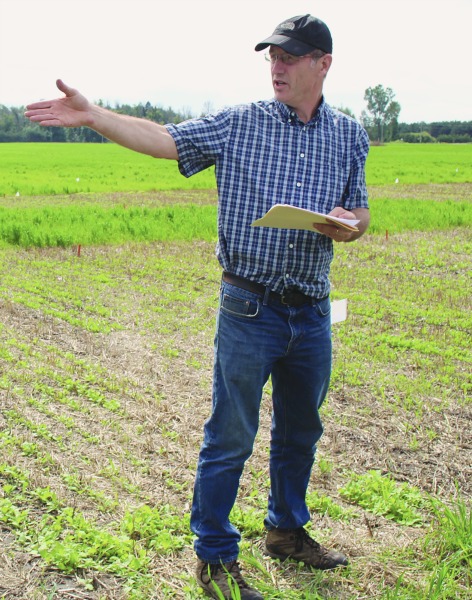Jun 13, 2018Videos, field days offer tools, techniques for weed control
Because weed management represents a major barrier to sustainable production of both field and vegetable crops, a team in associate professor Dan Brainard’s lab at Michigan State University (MSU) is learning about new tools and techniques for physical weed control, and they’re starting to share their results.
Brainard and a team of farmers and researchers traveled to Switzerland in April 2017 to a meeting of the Physical and Cultural Weed Control Working Group of the European Weed Research Society. They collected video footage of various tools in action, and recorded interviews of farmers and manufacturers describing the tools. Now, with support from two grants from the Sustainable Agriculture Research and Education program, they’re testing some of the European tools and techniques on-farm, and demonstrating them locally at field days.
Their first Midwest Mechanical Weed Control Field Day in Holt, Michigan in September 2017, had 140 participants, 100 of whom were farmers.
“This project has really focused on capturing farmer knowledge and experience in the use of these machines and sharing that knowledge in a concise way,” said MSU research assistant, Marisa Benzle. “The SARE grants made it possible to include our farmer partners from the beginning to the end.”
The MSU team has focused their research and demonstrations on in-row mechanical cultivation with torsion weeders, flex tine cultivators, finger weeders and disc hillers:
· The torsion weeder is an in-row cultivation tool that can be set up to be used on multiple or single row systems. It can be used in a variety of systems.
· The flex tine cultivator is an in-row and between-row cultivation tool. It was traditionally designed to be used in small grains but can be used in a wide range of crops to control small weeds.
· The finger weeder is an in-row cultivation implement that can be used for multiple row systems and walk behind tractors. It can be used in direct-seeded or transplanted crops.
· The disc hiller is a near-row cultivation tool that can be combined with between-row tools to remove weeds closer to the crop.
MSU graduate student and researcher, Sam Hitchcock Tilton, said often the greatest expense in vegetable production is weed control, especially within the crop row. He says these in-row tools can substantially reduce hand-weeding costs for vegetable growers.
“These tools are widely used in Europe,” said Hitchcock Tilton. “But there is little documented experience of these tools in the U.S. We wanted to trial these new in-row tools and some old ones to see how they can best be used, whether they work better in combination, and their overall promise for growers.”
Hitchcock Tilton has been testing a variety of in-row cultivation tools on eight cultivars of carrots, hoping that carrots would provide a good reflection of the strengths and weaknesses of each tool. He discovered that combining hilling discs with finger weeders resulted in the least amount of hand-weeding. He says for these tools to work it was essential that the crop was larger than the weeds and that the seedbed had been well-prepared. Although they did discover that certain cultivars of carrots were more cultivation tolerant, their results were not conclusive enough to make recommendations to growers at this time.
“The consensus from both on-farm and research-farm trials was that the finger weeder and flex tine weeders are versatile tools that work well on a wide range of transplanted and large-seeded direct-seeded crops,” said Brainard. “Although the torsion weeder can also work extremely well under the right conditions, it is more difficult to calibrate and integrate into diverse farming systems, and works well under a narrower set of soil and environmental conditions.”
Hitchcock will host another Midwest Mechanical Weed Control Field Day along with The Land Connection in Atlanta, Illinois on Sept. 26, 2018. Email Hitchcock Tilton for more info at [email protected].
Read more about these SARE-supported projects at https://projects.sare.org/sare_project/onc17-025/ and https://projects.sare.org/project-reports/gnc16-223/
Photo above: Michigan State University associate professor Dan Brainard is leading research about new tools and techniques for physical weed control.

















